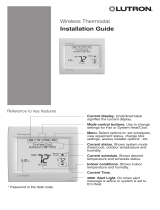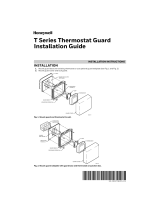
8
# ISU ISU Name ISU Options (factory default in bold)
221 Heat Stages / Backup Heat Stages Heat Stages: 1, 2
Backup Heat Stages: 0, 1
230 Fan Control in Heat 1 = Equipment Controls Fan
2 = Thermostat Controls Fan
253 Aux/E terminal control (TH6320
only)
0 = Drive both Aux & E together
1 = Aux and E independent
255 Backup Heat Source
(Heat Pump Only)
1 = Electric Forced Air
2 = Gas/Oil Forced Air (or Fossil Forced Air)
256 Emergency Heat Source (TH6320
only)
1 = Electric Forced Air
2 = Gas/Oil Forced Air (or Fossil Forced Air)
260 External Fossil Fuel Kit
(TH6320 / TH6220 only)
0 = Thermostat Controls Backup Heat
1 = External Fossil Fuel Kit Controls Backup Heat
270 Backup Heat Fan 1 = Equipment Controls Fan
2 = Thermostat Controls Fan
Note: Setting only active with TH6320 in Heat Pump mode.
271 Emergency Heat Fan 1 = Equipment Controls Fan
2 = Thermostat Controls Fan
Note: Setting only active with TH6320 in Heat Pump mode.
300 System Changeover
0 = Manual
1 = Automatic
303 Auto Changeover Differential 0 °F to 5 °F
0.0 °C to 2.5 °C
Note: Differential is NOT deadband. Differential means how far past the setpoint
before switching to the mode selected. Deadband setup is not an option.
Honeywell uses an advanced algorithm that fixes deadband at 0 °F. This is more
advanced than previous thermostats.
340 Backup Heat Droop
0 = Comfort
2 = 2 °F
3 = 3 °F
4 = 4 °F
5 = 5 °F
6 = 6 °F
7 = 7 °F
8 = 8 °F
9 = 9 °F
10 = 10 °F
11 = 11 °F
12 = 12 °F
13 = 13 °F
14 = 14 °F
15 = 15 °F
350 Upstage Timer for Backup Heat
0 = Off
1 = 30 minutes
2 = 45 minutes
3 = 60 minutes
4 = 75 minutes
5 = 90 minutes
6 = 2 hours
7 = 3 hours
8 = 4 hours
10 = 5 hours
355 Compressor Lockout / Balance Point
-- = Off
5 °F to 60 °F (in 5 °F increments)
15.0 °C to 15.5 °C (in 2.5 °C or 3.0 °C increments)
Note: Use a wired sensor to set compressor lockout / balance point on TH6320
/ TH6220.
356 Outdoor Lockout Backup Heat
-- = Off
5 °F to 65 °F (in 5 °F increments)
15.0 °C to 18.5 °C (in 2.5 °C or 3.0 °C increments)
365 Compressor Cycle Rate (Stage 1) 1 - 6
366 Compressor Cycle Rate (Stage 1) 1 - 6
370 Heating Cycle Rate (Stage 1) 1 - 12
371 Heating Cycle Rate (Stage 2) 1 - 12
Advanced setup options (ISU)













